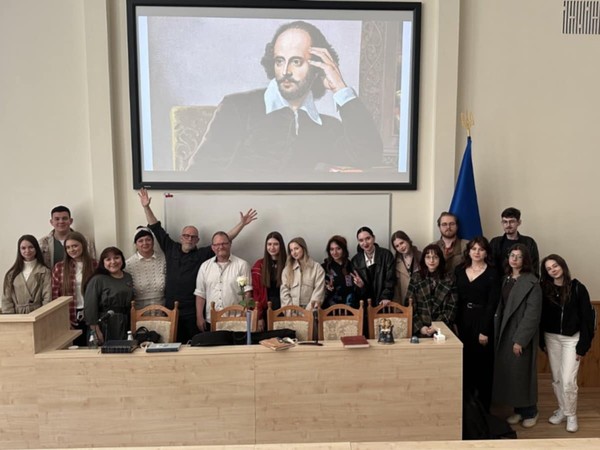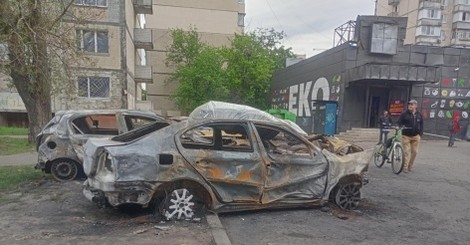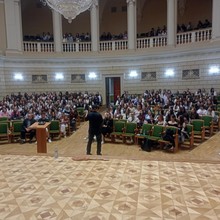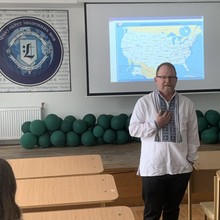Almost three and a half years have gone by since the full-scale invasion of Ukraine by Russia, with no end in sight. How are Ukrainian students and teachers coping with the stress and uncertainty of these trying times? They are hanging on as best they can, continuing to function despite the difficult circumstances.
I was recently able to visit seven different Ukrainian universities from five different cities from April 30 to May 23 thanks to the support of my home faculty and department and my patient wife. This was a follow-up to my previous stay of three months approximately one year ago. Once again the primary partner was Vasyl Stefanyk Carpathian (formerly Precarpathian) National University in the Western Ukrainian city of Ivano Frankivsk.
I was accompanied on my travels the first week by an old friend Professor Bryan Reynolds from University of California Irvine. Prof. Reynolds is not only a renowned academic, but also a playwright and director. He discussed one of his latest projects entitled “What’s an Artist to Do?: Performing Arts for Change in the Middle East, Africa, and South Asia”, which particularly resonated with our audiences in war-torn Ukraine wondering at times what the point of the arts and education is during these trying times. We gave lectures at Ivan Franko National University of Lviv and at Lviv Polytechnic University, both institutions our university already cooperates with. We then travelled to Kyiv where we visited the ProEnglish theatre company and had the opportunity to watch a dress rehearsal of a play entitled Occupation about the fate of the city of Kherson at the beginning of the full-scale invasion. Prof. Reynolds was particularly impressed and is interested in initiating further cooperation in the future. We also gave lectures at two new universities, at least for me: Kyiv National Linguistic University and Borys Grinchenko Kyiv Metropolitan University.
We were met with great enthusiasm and almost inevitably began with apologies for the current American administration and their lack of support for Ukraine. I mentioned, in contrast, my pride in the support provided by my adopted country.
After returning back to Lviv, Prof. Reynolds took a train back to Poland where he flew home and I made my way to Ivano-Frankivsk, my Ukrainian ‘home’, where I had a series of guest lectures focused on British Modernism, Ernest Hemingway and the Short Story, American History through Folk Music and conversational topics about education and the English language. I also visited two more partner cities and universities on day trips: Ternopil Volodymyr Hnatiuk National Pedagogical University and Yuriy Fedkovych Chernivtsi National University.
Ukrainian universities continue to persevere despite the seemingly endless war and the grim prospects for peace and stability. Each of the universities I visited had notice boards commemorating either current or former students or staff who have died in the war. The colleagues I met are not only grateful for personal visits, but welcome cooperation in terms of research and projects. I have been, for example, cooperating through co-authoring academic articles with members of both the English department and the theatre/music department in Ivano-Frankivsk. I have also published articles with a number of Ukrainian journals and accepted positions on their journal boards. I have been taking part in Ukrainian conferences online. I have finally discussed further cooperation including expanding the Erasmus+ exchange program to as many universities, faculties and departments as possible.
Out of the many powerful and memorable experiences during my stay, I would like to make mention of one in particular. Our hostess during our visit to Grinchenko University in Kyiv was a professor of world literature with a special interest in Shakespeare. She and her colleagues took Bryan and I on a tour of their campus including a recent bomb attack which took place practically next door to the university buildings. She had a constant smile during our visit and kept repeating how glad she was to have us as guests. She also told us, not bragging by any means, that she spent two hours every morning (seven days a week) working as a volunteer knitting camouflage nets for the military. This is in addition to teaching around twenty hours per week at the university. Our jaws dropped. I later found out that a number of university teachers do similar volunteer work.



